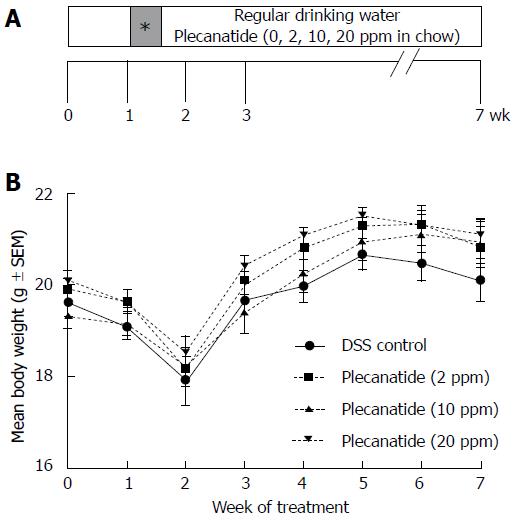Copyright
©The Author(s) 2017.
World J Gastrointest Pharmacol Ther. Feb 6, 2017; 8(1): 47-59
Published online Feb 6, 2017. doi: 10.4292/wjgpt.v8.i1.47
Published online Feb 6, 2017. doi: 10.4292/wjgpt.v8.i1.47
Figure 1 Inflammation-driven colorectal carcinogenesis in Apc+/Min-FCCC mice.
A: Outline depicting the experimental design of the animal study. Female Apc+/Min-FCCC mice (n = 23/group) were randomized into four treatment groups: DSS alone (vehicle control) or DSS plus diet supplemented with 2, 10 or 20 ppm plecanatide. One week later, all animals were administered 2% DSS in the drinking water for 4 d (shaded box with asterisk) and regular water for the remainder of the study. At the time of euthanasia, (7 wk of study), the entire colon were fixed in formalin for histopathological evaluation; B: Body weights of Apc+/Min-FCCC mice treated with either DSS alone or DSS plus a diet supplemented with indicated concentrations of plecanatide (n = 20-23/group). Body weights were obtained weekly, and DSS was administered to all animals on days 7-10 of study. DSS: Dextran sodium sulfate.
- Citation: Chang WCL, Masih S, Thadi A, Patwa V, Joshi A, Cooper HS, Palejwala VA, Clapper ML, Shailubhai K. Plecanatide-mediated activation of guanylate cyclase-C suppresses inflammation-induced colorectal carcinogenesis in Apc+/Min-FCCC mice. World J Gastrointest Pharmacol Ther 2017; 8(1): 47-59
- URL: https://www.wjgnet.com/2150-5349/full/v8/i1/47.htm
- DOI: https://dx.doi.org/10.4292/wjgpt.v8.i1.47









